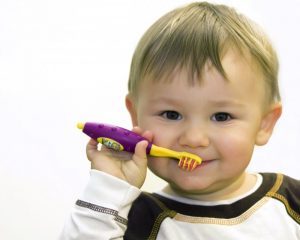 We can never overstress the importance of instilling good habits in your children from a young age. The sooner they learn to brush properly, the better chances they’ll have of avoiding dental problems and maintaining a beautiful smile that lasts a lifetime. Still, you might have questions about brushing. What kind of toothbrush and toothpaste are best for kids? When can you stop supervising their daily brushing and let them care for their own oral hygiene routine? Your children’s dentist in Center is here to give you some handy tips on these important matters.
We can never overstress the importance of instilling good habits in your children from a young age. The sooner they learn to brush properly, the better chances they’ll have of avoiding dental problems and maintaining a beautiful smile that lasts a lifetime. Still, you might have questions about brushing. What kind of toothbrush and toothpaste are best for kids? When can you stop supervising their daily brushing and let them care for their own oral hygiene routine? Your children’s dentist in Center is here to give you some handy tips on these important matters.
Choosing the Right Toothbrush
When your child is a baby, you may just use a soft cloth to clean their gums, but when teeth start appearing, it’s time for them to graduate to a brush. Toothbrushes for babies and toddlers have small heads that are designed to fit comfortably in a little mouth, but the handles are big enough to provide a comfortable grip for the user. The bristles are soft so they have little chance of irritating your child’s gums.
As your child grows, you can get them a toothbrush with a slightly bigger head. Many tooth cleaning tools for kids in the 5 – 8 years old age range feature fun cartoon characters that will make oral hygiene a bit more fun for your young one. You may even want to consider getting an electric brush for your child to make brushing time even more exciting.
Picking a Toothpaste
Here are a few things to look for in a toothpaste for young children:
- The American Dental Association seal of approval. This means that a particular toothpaste has been tested and certified safe for use on teeth.
- Some parents are concerned that fluoride isn’t good for their children, but it’s actually critical for oral health in people of all ages! It fortifies the enamel and helps to prevent cavities. Just be sure to supervise your children so they don’t end up swallowing a lot of their toothpaste.
- A fun flavor. Picking a paste in a flavor that your child likes (some kids think traditional mint is boring) may give them the motivation they need to appreciate their daily oral hygiene routine.
Handing Over the Reins
Of course, children mature at different rates, so it’s impossible to say exactly when you can stop supervising your child’s daily brushing. Generally, though, most kids age 8 and older have the necessary motor skills and knowledge to care for their own teeth.
If you have any doubts about whether your child is ready to take full responsibility for their own brushing, have them swish with a plaque-highlighting rinse after they brush on their own. If they’ve managed to vanquish all or most of the plaque, you can rest assured that you’ve done a great job of teaching your child to brush.
We hope the above tips will prove helpful in your efforts to help your child have a healthy smile!
About Us
The dentists and the rest of our staff are focused on promoting children’s dental hygiene in Center. If you have questions about how to care for your little one’s teeth, or it’s time for a professional to look at that precious young smile, please contact us at 936-657-1942.
